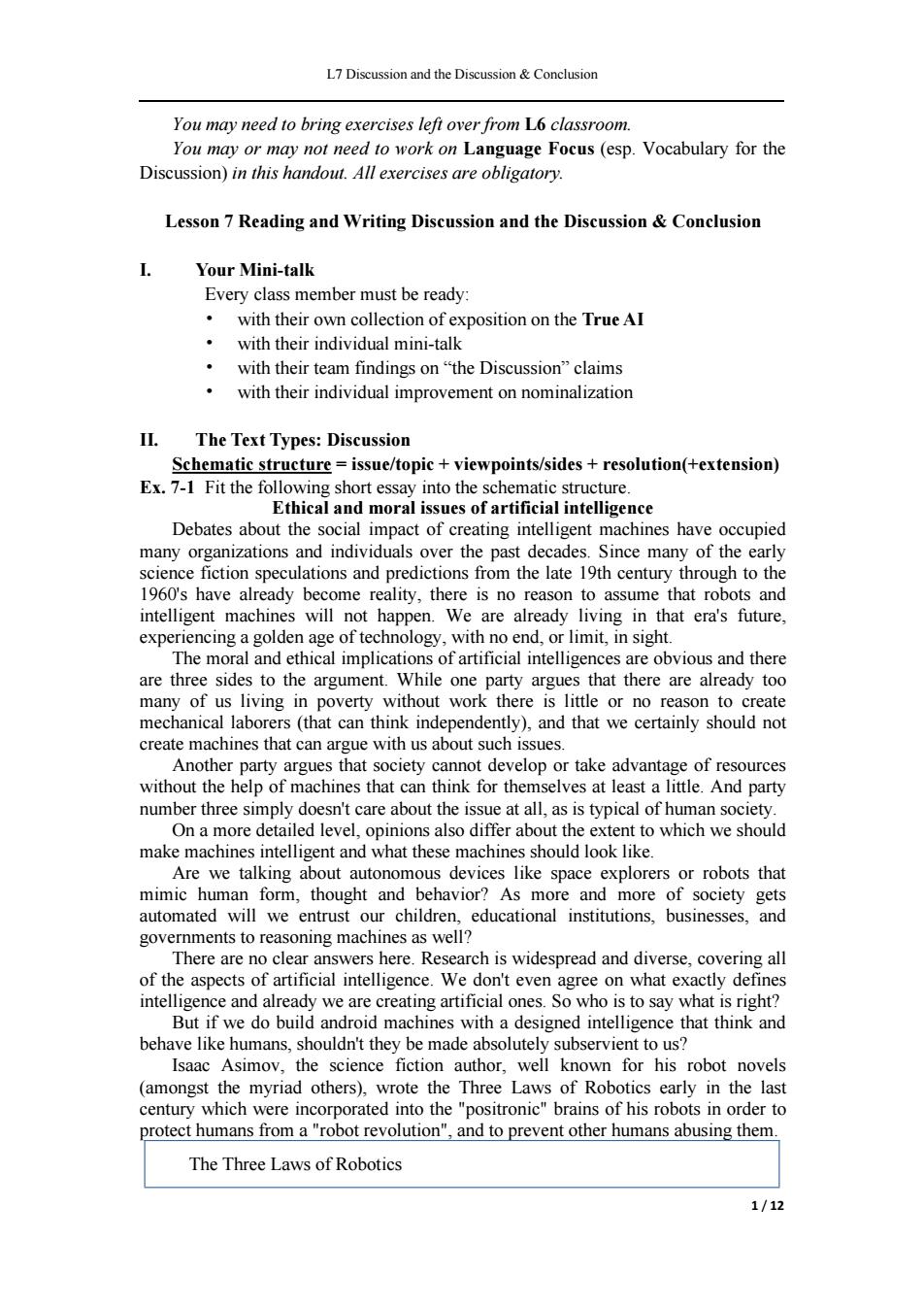正在加载图片...

L7 Discussion and the Discussion Conclusion You may need to bring exercises left over from L6 classroom. You may or may not need to work on Language Focus (esp.Vocabulary for the Discussion)in this handout.All exercises are obligatory. Lesson 7 Reading and Writing Discussion and the Discussion Conclusion I. Your Mini-talk Every class member must be ready: with their own collection of exposition on the True AI with their individual mini-talk with their team findings on "the Discussion"claims with their individual improvement on nominalization II.The Text Types:Discussion Schematic structure issue/topic viewpoints/sides resolution(+extension) Ex.7-1 Fit the following short essay into the schematic structure. Ethical and moral issues of artificial intelligence Debates about the social impact of creating intelligent machines have occupied many organizations and individuals over the past decades.Since many of the early science fiction speculations and predictions from the late 19th century through to the 1960's have already become reality,there is no reason to assume that robots and intelligent machines will not happen.We are already living in that era's future, experiencing a golden age of technology,with no end,or limit,in sight. The moral and ethical implications of artificial intelligences are obvious and there are three sides to the argument.While one party argues that there are already too many of us living in poverty without work there is little or no reason to create mechanical laborers(that can think independently),and that we certainly should not create machines that can argue with us about such issues. Another party argues that society cannot develop or take advantage of resources without the help of machines that can think for themselves at least a little.And party number three simply doesn't care about the issue at all,as is typical of human society. On a more detailed level,opinions also differ about the extent to which we should make machines intelligent and what these machines should look like. Are we talking about autonomous devices like space explorers or robots that mimic human form,thought and behavior?As more and more of society gets automated will we entrust our children,educational institutions,businesses,and governments to reasoning machines as well? There are no clear answers here.Research is widespread and diverse,covering all of the aspects of artificial intelligence.We don't even agree on what exactly defines intelligence and already we are creating artificial ones.So who is to say what is right? But if we do build android machines with a designed intelligence that think and behave like humans,shouldn't they be made absolutely subservient to us? Isaac Asimov,the science fiction author,well known for his robot novels (amongst the myriad others),wrote the Three Laws of Robotics early in the last century which were incorporated into the "positronic"brains of his robots in order to protect humans from a"robot revolution",and to prevent other humans abusing them. The Three Laws of Robotics 1/12L7 Discussion and the Discussion & Conclusion 1 / 12 You may need to bring exercises left over from L6 classroom. You may or may not need to work on Language Focus (esp. Vocabulary for the Discussion) in this handout. All exercises are obligatory. Lesson 7 Reading and Writing Discussion and the Discussion & Conclusion I. Your Mini-talk Every class member must be ready: • with their own collection of exposition on the True AI • with their individual mini-talk • with their team findings on “the Discussion” claims • with their individual improvement on nominalization II. The Text Types: Discussion Schematic structure = issue/topic + viewpoints/sides + resolution(+extension) Ex. 7-1 Fit the following short essay into the schematic structure. Ethical and moral issues of artificial intelligence Debates about the social impact of creating intelligent machines have occupied many organizations and individuals over the past decades. Since many of the early science fiction speculations and predictions from the late 19th century through to the 1960's have already become reality, there is no reason to assume that robots and intelligent machines will not happen. We are already living in that era's future, experiencing a golden age of technology, with no end, or limit, in sight. The moral and ethical implications of artificial intelligences are obvious and there are three sides to the argument. While one party argues that there are already too many of us living in poverty without work there is little or no reason to create mechanical laborers (that can think independently), and that we certainly should not create machines that can argue with us about such issues. Another party argues that society cannot develop or take advantage of resources without the help of machines that can think for themselves at least a little. And party number three simply doesn't care about the issue at all, as is typical of human society. On a more detailed level, opinions also differ about the extent to which we should make machines intelligent and what these machines should look like. Are we talking about autonomous devices like space explorers or robots that mimic human form, thought and behavior? As more and more of society gets automated will we entrust our children, educational institutions, businesses, and governments to reasoning machines as well? There are no clear answers here. Research is widespread and diverse, covering all of the aspects of artificial intelligence. We don't even agree on what exactly defines intelligence and already we are creating artificial ones. So who is to say what is right? But if we do build android machines with a designed intelligence that think and behave like humans, shouldn't they be made absolutely subservient to us? Isaac Asimov, the science fiction author, well known for his robot novels (amongst the myriad others), wrote the Three Laws of Robotics early in the last century which were incorporated into the "positronic" brains of his robots in order to protect humans from a "robot revolution", and to prevent other humans abusing them. The Three Laws of Robotics